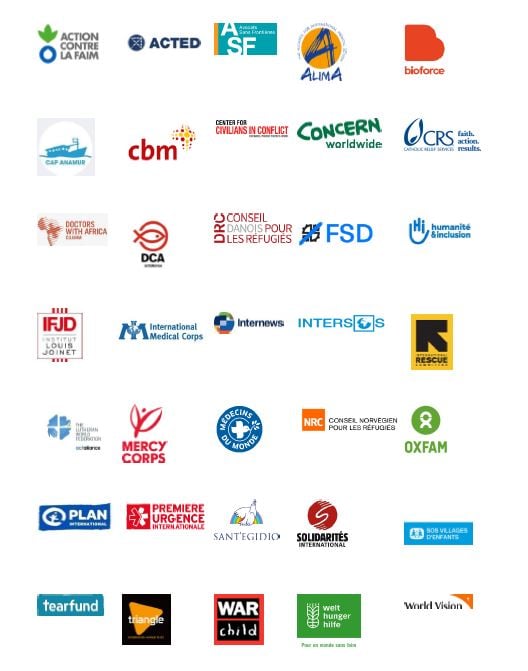Central African Republic | International NGOs express deep concerns about humanitarian crisis
AUGUST 31, 2021
AUGUST 31, 2021
Today, more than one out of two Central Africans is food insecure according to the World Food Programme (July 2021). In addition, more than one in four people are either refugees or internally displaced, the number of displaced people in CAR has reached 1,417,542 (UNHCR, 30/06/2021), the highest number since 2014. In addition to the displacements caused by insecurity, flood victims represent 30% of the displacements between May and June 2021.
"These recurrent displacements and insecurity are seriously impacting agricultural production, which is already weakened by climate disruption, crop diseases and difficulties in accessing inputs and farming tools. This not only destabilizes the country's food security but also impacts the livelihoods of rural households that depend heavily on subsistence farming for their survival" said Mathilde Lambert, Country Director of Action Against Hunger-CAR.
Repeated attacks on patients, staff, medical assets and infrastructure, as well as insecurity, have disrupted access to health care. The situation is worrying because CAR's health indicators continue to be particularly alarming. The country has the worst infant mortality rate in the world (WB, 2019) and one of the worst maternal mortality rates in the world (WB, 2017).
"The impact of the conflict and humanitarian crisis in the Central African Republic on the mental health of affected populations is often underestimated. On the ground, we observe symptoms of depression, anxiety or psychosis," says Dr. Christian Mulamba, Country Director at International Medical Corps. Plagued by a measles epidemic since 2020, the country has also experienced major malaria epidemics, which remains the leading cause of morbidity. As a result, CAR population has a life expectancy of 53 years, one of the lowest in the world.
After a year 2020 disrupted by the COVID-19 preventive health restrictions, the conflict has disrupted the functioning of an already precarious education system: student absenteeism, school closures due to insecurity, occupation of schools by displaced populations or by armed actors. This situation permanently compromises the future of Central African youth and particularly that of internally displaced children and that of girls living in the conflict areas.
While men account for the majority of the conflict's dead and wounded, women, girls, boys, and people living with disabilities are greatly affected by difficulties in accessing basic social services (education, sexual and reproductive health care, nutrition, etc.) and by protection problems. Reported sexual violence is on the rise in the country and disproportionately affects women and girls.
To date, the humanitarian response plan in CAR is only half funded. International NGOs are calling for the mobilization of Central African authorities and donors to ensure the humanitarian response and the protection of civilians.
--------------------------------------
Since the week of December 14, 2020, armed clashes have broken out in the Central African Republic and continue to this day. Civilians, humanitarian workers, and medical staff have not been spared from the wave of violence that has since taken place in the country. The number of incidents affecting humanitarians between January and June 2021 has increased by 39% compared to the same period last year. Despite the insecurity, humanitarians provided assistance to 25% of the population during the first quarter of 2021.

Humanity & Inclusion has worked in the Central African Republic since 1994, and since 2016, the organization has worked to ensure that the most vulnerable people receive the life-saving, life-enabling aid they need after three years of acute crisis.
Since gaining its independence in 1958, the country has experienced chronic instability as a result of regular military coups and the repeated failure to transition to a democratic system.
Since the emergence of the Covid-19 pandemic in Central African Republic, Humanity & Inclusion's 146-person team has developed inclusive awareness projects on personal protection measures. Through its logistics platform projects, Humanity & Inclusion supports and facilitates the delivery of aid by humanitarian organizations throughout the country.
Humanity & Inclusion is an independent international aid organization. It has been working in situations of poverty and exclusion, conflict and disaster for close to 40 years. Working alongside people with disabilities and people living in situations of extreme vulnerability, our action and testimony focus on responding to their essential needs, improving their living conditions, and promoting respect for their dignity and basic rights. Since its 1982 founding, Humanity & Inclusion has set up development programs in more than 60 countries and intervenes in numerous emergency situations. The network of eight national associations (Belgium, Canada, France, Germany, Luxembourg, Switzerland, the United Kingdom and the United States) works constantly to mobilize resources, jointly manage projects and to increase the impact of the organization’s principles and actions. Humanity & Inclusion is one of six founding organizations of the International Campaign to Ban Landmines (ICBL), the co-winner of the Nobel Peace Prize in 1997. The organization has numerous prizes to its name, including the 2011 Conrad N. Hilton Humanitarian Prize, the 1996 Nansen Prize, and two 2020 Horizon Prizes for innovation. Humanity & Inclusion acts and campaigns in places where “living in dignity” is no easy task.
Get the latest news about Humanity & Inclusion's work delivered straight to your inbox.
ABOUT US
Humanity & Inclusion U.S.
8757 Georgia Avenue
Suite 420
Silver Spring, MD 20910
MORE INFORMATION
Humanity & Inclusion is a nonprofit 501(c)(3) organization (EIN/tax ID number: 55-0914744). Contributions are fully tax-deductible to the extent allowable by law. CFC #51472
None of the funds donated through this website will benefit activities in the following countries: Cuba, Iran, North Korea, the Crimea Region, or Syria. Humanity & Inclusion does not have programs in all of these countries.